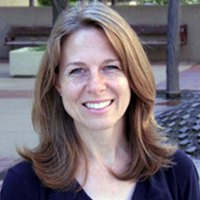Last month, in conjunction with the 11th annual World Autism Awareness Day , the Indian Health Service (IHS) hosted the Autism Awareness Interagency Roundtable. Partners across the U.S. Department of Health and Human Services , to include IHS, came together to showcase the significant efforts to increase awareness and provide necessary services and supports to children with Autism Spectrum Disorder (ASD) and their families. The exciting collaborative efforts of ECHO Autism and the Navajo Nation were shared during the roundtable discussion.
Adapted from the Project Extension for Community Healthcare Outcomes (Project ECHO) framework developed at the University of New Mexico, the ECHO Autism model was developed at the University of Missouri by Drs. Kristin Sohl and Micah Mazurek. Supported by the Autism Speaks Autism Treatment Network (ATN) and the Health Resources and Services Administration’s/ Autism Intervention Research Network on Physical Health (AIR-P), ECHO Autism uses video conferencing technology to connect primary care providers (PCPs) from rural communities to an interdisciplinary team of autism experts). Results of a six-month pilot indicated significant improvements in PCP self-efficacy and increased use of autism screening tools and resources. More recently, the ECHO Autism model has expanded and now includes a pilot project, the ECHO Autism: Screening Tool for Autism in Toddlers and Young Children (STAT). This innovative model allows PCPs to present cases of young children at highest risk for ASD for diagnostic verification to the expert hub team. Providers present results from the interactive screening assessment, STAT, in combination with medical and developmental information. With diagnostic verification from the hub team, providers have diagnosed young children faster, bypassing lengthy waiting lists at university diagnostic centers. The faster diagnosis then allows children to access intervention services at earlier ages which have been shown to improve developmental outcomes.
Through collaborations with AIR-P, a variation on the ECHO Autism STAT model expanded to providers on the Navajo Nation. Our collaboration began in January 2017, after the former President of the American Academy of Pediatrics (AAP), James Perrin, MD, identified the need for autism identification and diagnosis in rural communities. Dr. Perrin connected established ECHO partners with several Navajo Area pediatricians to investigate local interest in beginning an ECHO Autism clinic through collaborations with the University of Missouri, University of New Mexico, and the Navajo Nation pediatric providers. We held our initial two-day training meeting in Chinle, Arizona, and were joined by 15 IHS providers from several Navajo Area medical facilities. We provided initial training on symptoms of ASD, followed by a STAT training and overview of the ECHO Autism project. Beginning in April 2017, we began hosting ECHO Autism clinics, which included case presentations and didactic sessions to increase broad understanding of the diverse presentations of autism, medical and behavioral co-occurring conditions that are often associated with the diagnosis, as well as explaining the often confusing myriad of therapies and services that exist in educational and community settings. Providers are now using the STAT in their practices to better understand symptoms in young children and make informed referrals for comprehensive diagnostic evaluations.
We have been incredibly fortunate to learn from our collaborations about the cultural traditions and rural factors that influence child development and health care practices. We look forward to continuing our work with providers across Navajo Nation and increasing the reach of ECHO Autism, including the expansion of the ECHO Autism STAT diagnostic model to expedite access to diagnostic evaluations.
This project is supported by the Health Resources and Services Administration (HRSA) of the U.S. Department of Health and Human Services (HHS) under cooperative agreement UA3 MC11054 – Autism Intervention Research Network on Physical Health. This information or content and conclusions are those of the author and should not be construed as the official position or policy of, nor should any endorsements be inferred by HRSA, HHS or the U.S. Government.
Related Content:



